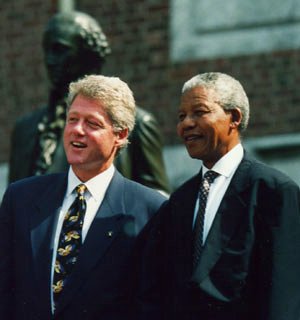Leader
A leader is somebody whom people follow. A leader has authority. For people to accept a leader, his or her leadership must therefore be legitimate.

Because people follow a leader, the leader can make people do things. A leader can therefore make people work together towards a common goal.[1]
An example of a leader is the head of government of a country. People within the government follow the leader, and citizens look to the head of government for inspiration and guidance. Sometimes, when a head of government lacks legitimacy, people will stop following him or her. The head of government is therefore no longer able to lead properly. This may result in a new election, or in worst case civil war.
A group with no leader is called leaderless.
Leader Media
An APEC leader setting the tone for the 2013 APEC CEO summit with an opening speech
Florentine Secretary Niccolò Machiavelli detailed his ideas on rulership in The Prince, which is a popular and controversial work on government rule.
General David Petraeus talks with U.S. soldiers serving in Afghanistan.
Julius Caesar, one of the world's greatest military leaders
References
- ↑ Edwin A. Locke, The Essence of Leadership: The Four Keys to Leading Successfully (New York: Lexington Books; Toronto: Maxwell Macmillan Canada; New York: Maxwell Macmillan International, 1991), p. 2
Related page
Other websites
- 'The Vision Thing': How Effective Leaders Cultivate and Co-ordinate Social Identity in Order to Promote Followership Archived 2008-02-03 at the Wayback Machine
- Leadership Qualities
| Wikimedia Commons has media related to Lua error in Module:Commons_link at line 62: attempt to index field 'wikibase' (a nil value).. |




